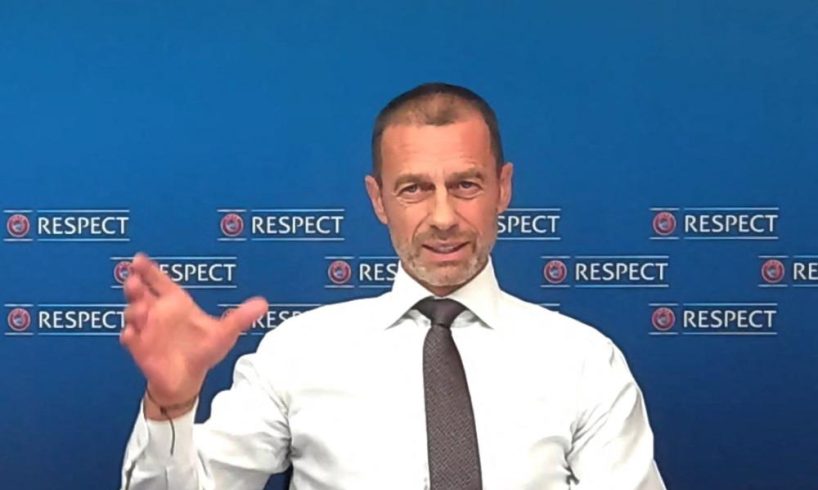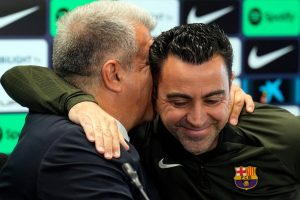
Photograph: Reuters
Speak to a dozen people about the practical implications of Thursday’s Super League ruling and you get almost as many wildly differing answers. It is a unique situation where “what’s next?” is a question nobody can answer with insurmountable authority. All sides were inevitably primed to proclaim some degree of victory and, as the afternoon went on, the information war became at least as important as the decision itself.
That was understandable given the stakes. The original Super League plan failed in April 2021 because supporters of the six English clubs that jumped ship simply would not tolerate the idea. Giving any ground back had the potential to be costly so it was no surprise when, after the A22 chief executive officer, Bernd Reichart, presented its reworked proposal at midday, Uefa and its allies clicked into gear.
Related: Revamped European Super League may flop but the door for change is now open | Paul MacInnes
Reichart’s briefing had been slick but low on substance. Questions regarding funding, entry criteria and signed-up clubs were largely elided, while the proposed league mechanism still appeared to heavily favour the bigger fish. Free streaming of matches was pushed as the major selling point to anyone watching but, as the differences between star, gold and blue tiers were spelled out, it was not hard to wonder whether any of this would land among a public already growing fatigued with bloated, revised tournament formats.
Nonetheless A22 had a platform and, by extension, a degree of legitimacy. It was helped by inaccurate early headlines that announced a decisive defeat for Uefa and the beginning of a brave, distinctly unknown new era for European football. An untruth travels round the world before the real version of events has gathered breath; almost three days later, tens of thousands will have been left with at least a lingering sense that the sport is up for grabs.
Uefa’s response, a rare press conference in concert with the European Club Association [ECA] and other stakeholders, was swift and largely mocking. “It’s hard to decide if we should be shocked or amused by the show we have seen,” said Aleksander Ceferin of his experience logging on to absorb Reichart’s charts and graphics, which had the air of being transmitted from a Bond villain lair. “Since it’s close to Christmas I would choose amusement.” Nasser al-Khelaifi, the ECA chairman, could not resist pointing to the row of Champions League trophies that had earlier been displayed behind Florentino Pérez as he hailed a putative fresh dawn.
Figures close to the ECA, which is the sole recognised representative of clubs’ interests to Uefa, were quick to frame their body as the real winners and that may not be a million miles from the truth. Even so the ECA was, well into Thursday afternoon, eager that its members issued statements repudiating any notion of a Super League.
Many obliged before the day was out; Arsenal, with a relatively cautious response, were one of the key players to take their time; Anderlecht, the Belgian giants who are among those the modern game has left behind, left little off the table with a circumspect offering later on Friday. But the desire for message discipline, controlling the narrative and preferably getting ahead of it, spoke of the importance placed on wider perception.
Reality will take hold soon enough but its form is uncertain. The door is open for Uefa’s pre-authorisation system for international club competitions, already revised to bring it closer to European Union law since the case was initially brought, to be tested and there will be parties interested in taking the bait. The likelihood seems that A22, although not lacking sympathisers in principle among once-successful clubs that feel sidelined, will end up in effect a stalking horse for whichever party rustles up enough cash and coherence to propose a new Super League.
Where could the money come from? There is a view that Saudi Arabia, committed to hosting the World Cup in 2034, will not see value in rocking the authorities’ boats before then. Perhaps investors in Qatar or the United States may take note. But Uefa has retained its right of refusal and feels confident that, having made the necessary tweaks, it would fend off any such approach. In any case, a successful breakaway tournament appears a pipe dream until English clubs feel they have the latitude to join in once again.
Related: Real Madrid and Barcelona steadfast in reminding Uefa who they are
One universal consensus is that the European Court of Justice ruling gives clubs greater power in the structuring of future competitions. That is where the ECA, which is in the process of more than doubling its membership to around 700, can feel its hand has been strengthened. Should the sprawling new “Swiss system” format of the Champions League, which takes hold next season for Uefa’s coming three-year cycle, not satisfy enough appetites it would be confident of holding sway in negotiations over fresh formats.
Perhaps cross-border competitions for all bar a few top leagues, long mooted but being taken increasingly seriously behind the scenes across Europe, will be easier to push through. Potential formats have been weighed up in several regions and their execution may ultimately depend on the egos of those managing local status quo.
The ECA’s relationship with Uefa has changed markedly over the past two years: under a joint venture launched in September, the pair shared control of commercial rights for the governing body’s competitions. Uefa’s monopoly over its flagship events was broken, albeit by a close partner, and there may be the appetite to gain further sway.
Those in search of new developments in the saga can, at the barest minimum, safely hibernate. As Jürgen Klopp put it, Uefa has been given “a bit of a shake”; it would take a brave onlooker, though, to argue that the dust will settle any time soon.






